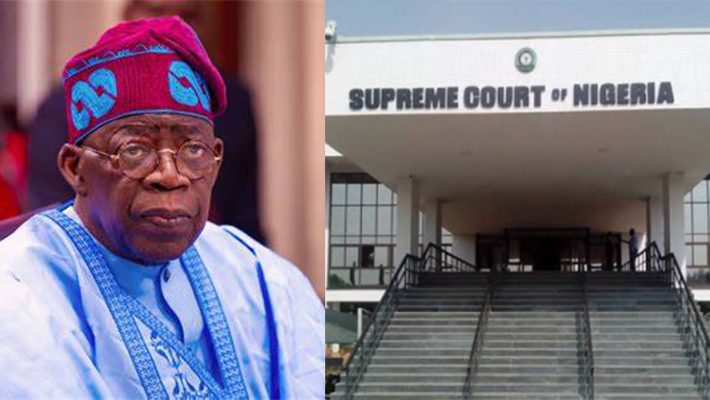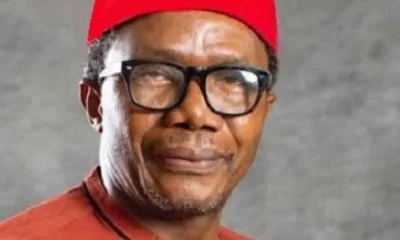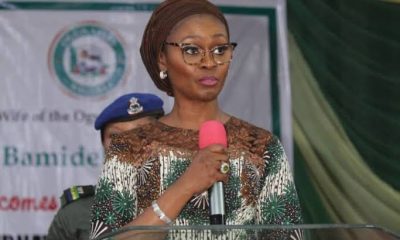News
Stakeholders Counsel Government On Status Of LCDAs

Stakeholders have advised the federal government not to throw away the baby with the bath water in dealing with the issue of Local Council Development Areas (LCDAs) created by some states as it implements the decision of the Supreme Court on local government financial autonomy.
The News Agency of Nigeria (NAN) recalls that the Supreme Court on July 11, delivered a landmark judgment affirming the autonomy of local governments in taking decisions, actions and financial expenditures independently without approval from their state governors.
In a survey conducted by the News Agency of Nigeria (NAN) in Osun, Ondo and Ekiti States, stakeholders said that though the 1999 constitution recognises just 774 local government councils, the LCDAs should not be scrapped in executing the order of the Supreme Court on financial autonomy for local governments.
According to the stakeholders, the Federal allocation to local government councils should be shared with LCDAs, which were carved out from the former for effective administrative purposes.
Dr Taiwo Arobadi, the Administrative Officer, Department of Local Government and Development Studies, Obafemi Awolowo University (OAU), Ile-Ife, said that the decision of the Supreme Court on financial autonomy of LGAs was a welcome development and appealed to state governors to comply.
Arobadi, who is also the Chairman, Senior Staff Association of Nigeria Universities (SSANU), OAU branch, however, said that the LCDAs created by some state governors should not be scrapped, but rather should be maintained for effective administration and development at the grassroots
Also, the Osun Commissioner for Local Government and Chieftaincy Affairs, Mr Dosu Babatunde said that the state was planning to conduct elections into the 30 local government areas in the state on Feb. 22, 2025.
Babatunde, in an interview with the News Agency of Nigeria (NAN) said that after the election, part of the funds that would be paid directly to the local government from the federal allocation would be used to run the Local Council Development Areas (LCDAs) to be created in the state.
The commissioner said that though there were currently no LCDAs in the state, but plans were in the works to create them after the conduct of local government elections in 2025.
According to him, LCDAs would be administrative offices under the local government councils and funds would be administered to them for effective operations by the local governments.
“LCDAs are part of the local government areas and once money is given to them by the federal government, part of it will be used to fund the LCDAs. But how they will use it is of no concern to us,” the commissioner said.
Similarly, the Ondo State Commissioner for Local Government and Chieftaincy Affairs, Alhaji Amidu Takuro, said that the state government held the judgment of the Supreme Court on local government autonomy as sacrosanct.
“There are still processes that need to be carried out by the federal government for the full implementation in compliance with the law of the land and the National Assembly is still working on that,” he said.
“The commissioner said that some challenges had hindered the state from conducting local government election, but added that after the conduct of the governorship election on Nov. 16, the council polls would be held.
“Already, the process of local government election has begun and the government has made an announcement for the conduct of our local government election come January next year,” he said.
Takuro said that stakeholders were still awaiting conclusions on the amendment process being carried out by the National Assembly on the section of the constitution on the local government financial autonomy.
“There are some sections of the law that need to be amended before this Supreme Court judgment can be fully implemented. We know before they carry out all these things, our election will have come and gone,” he stated.
The commissioner said that the constitution provides for 774 local governments within the federation and that the allocation should be given to the774 local government.
“If we have LCDAs, as we have in many states, they are still under that local government. It is an internal arrangement within the system,” he said.
Takuro said that the state law on the arrangement between local government and the LCDAs would be a unique one, promising that such law would not contravene the position of the judgment of the Supreme Court.
The commissioner said that the state government had not at anytime touched local government allocation, but the money was shared to authorised and appropriate bodies.
Takuro, however, said that his only major concern was for retirees at the local governments who would suffer if the financial autonomy of local governments is strictly implemented.
” My major concern is that retirees at local government will suffer, in the sense that, like our state as a case study now, for the past few months, we’ve been dedicating billions of naira for the payment of their gratuities.
“If we start operating in full compliance with the Supreme Court judgment, many of these pensioners will cry. We are still in 2013 now. For 2013 alone, we need N3.8 billion to offset 2013 alone.
” We’ll still be going to 2014, 2015, 2016, 2017, 2018, 2020 and till 2024. That’s about 11 years difference now that we’re still working on. And the governor is determined that these old people have paid their price and they must be paid.
“We should do whatever we can to make sure that we put a smile on their faces. That has been his own policy. We said it is better that we do stomach infrastructure than building roads while many people are dying,” he said.
Also speaking to NAN, Mr Japhet Oluwatoyin, the Chairman of the state House of Assembly Committee on Local Government and Chieftaincy Affairs, said that there was need by the federal government to extend the 90-day window to allow other states to conduct their local government election.
“ In Ondo State for instance, we have a peculiar situation. We cannot hold governorship and local government elections together. That is whey January is fixed for the local government election.
“ Maybe there should be extension of that window to allow a state like Ondo State to conduct its election.,” he said.
Speaking on funding of LCDAs, the lawmaker, who represents Akoko North-East, explained that the state House of Assembly still had the power to legislate over local government and the LCDAs.
“The Supreme Court did not remove supervision power of local government from the state assembly. It still has power to legislate on how the LCDAs will be funded.
“Allocation will be sent to local government area as and the funding of LCDAs will be an internal arrangement between the two. LCDAs are still within the confines of local governments.
“We still have power to supervise spending of the local government and we can still call them,” he said.
Oluwatoyin asked all stakeholders to ensure smooth implementation of the judgment, saying that if care was not taken the pronouncement might cause more problems than solving them.
“What we intend to achieve may go contrary if care is not taken. There are some local governments that may not be able to pay their workers a’ salaries if the judgement is fully implemented.
“Some local governments have a lot of primary school teachers to be paid and other staff.
” Everybody should go to drawing board and bring out a workable plan on how this thing will work out so that no staff will go without his pay,” he said.
“The Commissioner for Local Government Affairs, Mr Folorunso Olabode, who spoke on the issue, urged local governments to prioritise the needs of their communities.
Olabode spoke at the 2025-2027 Medium Term Expenditure Framework’ Workshop for relevant officers of local governments and local council development areas, organised by the Ministry of Local Government Affairs, in collaboration with the Budget, Economic Planning and Performance Management departments.
The workshop was aimed to educating the council officials on setting up the MTEF framework, a three-year rolling plan, aligning budgeting processes with developmental goals to ensure sustainable growth.
“It is imperative to address the issue of local government financial autonomy as it affects strategic planning, fiscal management, and resource allocation.
“We need to ensure that our resources are used efficiently and directed towards programmes that will have the greatest impact on our citizens’ lives”, he said.
Olabode said though Gov. Abiodun Oyebanji had honoured his pledge not to interfere with council funds, the governor remained committed to prioritising grassroots development.
Also speaking on the autonomy issue, the Chairman of Ikole Local Government Area in Ekiti, Mr Bayo Omojola said the Local Councils Development Areas(LCDAs) would likely have financial problems, if autonomy is fully implemented by the Federal Government.
He said that the 16 local government areas of Ekiti captured in the 1999 Constitution would be funded directly from the federation account on monthly basis, while the LCDAs won’t receive funds directly from the FG.
Omojola said the constitutionally recognised local governments too, would also have their own share of challenges, as they would now be saddled with the responsibility of carrying out their own projects, such as construction of roads, building of schools and employment of personnel.
“In this circumstance, funding of the LCDAs can cause loss of employment, unless both the state and local governments find means of giving subvention to them.
“With the current economic reality and challenges, the autonomy will have effect on the LCDAs because the chairmen of the 16 local government areas will also want to ensure that they set up agendas for the development of their communities.
“All these programmes will have financial implications on LCDAs, unless the chairmen decide not to carry out their statutory duties, even when they have the financial autonomy,” he said.
A legal practitioner, Mr Olumide Adeniyi, expressed concerns that many state governors in Nigeria were yet to comply with the Supreme Court judgment on the local government financial autonomy.
He urged Attorney Generals of states to advise their governors against violating the Supreme Court’s landmark judgment on issue of local government financial autonomy.
He said that the combined Sections 162, 163 and Section 7 of the 1999 Constitution, as amended, had long attacked the old order of Joint Accounts Allocation Committee, whereby allocation to local governments pass through states, before the Supreme Court judgment was delivered.
He cited the remarks of Dr Adamu Aliyu, the former Chairman of the Independent Corrupt Practices and Other Related Offence Commission (ICPC) that local governments must be financially independent, and that any state level official, who violates the decision of the Supreme Court would be held responsible and accountable for gross misconduct.
(NAN)
-

 News4 days ago
News4 days agoInsecurity: Kogi Schools Resume On Monday
-

 Opinion4 days ago
Opinion4 days agoDon’t Pull the Plug: Why Nigerians Are Pleading for the U.S. to Extend Its Police Training Program — and Why It Must Synergize With New Military Arrivals
-

 Crime3 days ago
Crime3 days agoVigilante Reportedly Shoots Colleague Dead In Plateau
-

 Crime4 days ago
Crime4 days agoMan Shot Dead In Ambush Along Jol-Sho Road In Plateau











